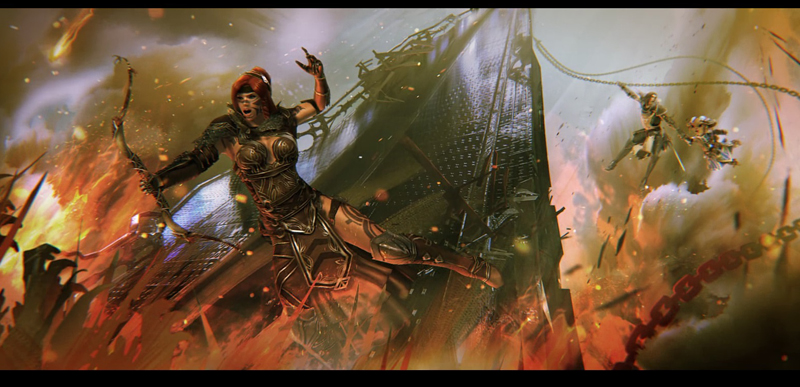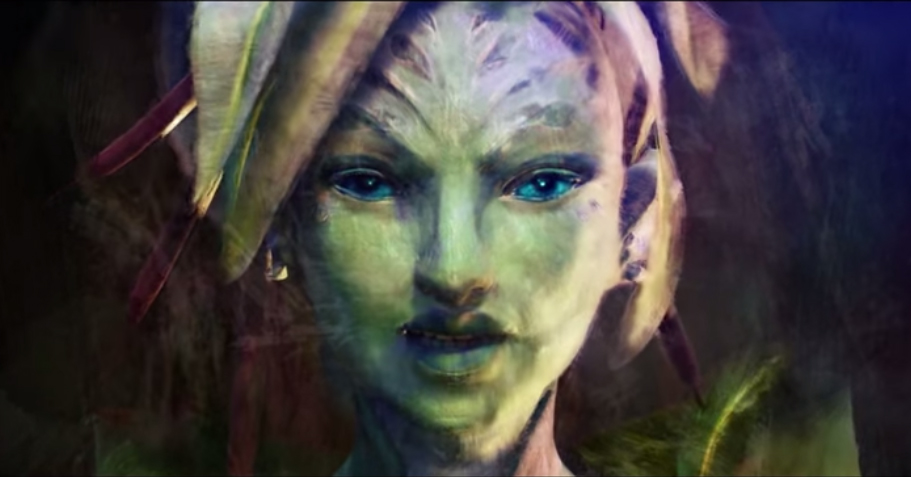
GW2: My Caithe Conundrum
Warning: Spoilers.
Also, I have a feeling this is going to be a long post.
Anyhow, Syn and I decided to finish up all the living story episodes in GW that we hadn’t completed up until now. This included Seeds of Truth and Point of No Return.
The problem with being a writer is that I analyze everything I read, watch and game. Sometimes it’s difficult to just sit down and enjoy something for what it is because, like hearing fingernails on a chalkboard, wonky plot or character development is downright painful.
This happens here where I feel that the writers sacrifice characters, plot and just plain logic to try to build up another character. It’s so forced and makes so little sense that it’s hard to watch.
Checking that Build
One side note.
I mentioned in the comments of my previous post that I wondered if my warrior’s build was out of date, which was the source of frustration when battling in these new scenarios. I checked it out, and actually, the build is still the basic zerker build that is recommended for greatsword warriors. I noticed when I went to fight non-Mordrem enemies – like when I needed to clear out bandits to open a skritt tunnel – I had no issues dispatching them, and actually felt like I was a semi-competent player again.
The moment I had to face down swarms of Mordrem, the frustrations returned. So I guess it’s the Mordrem’s designs, coupled with high density, that are the cause of my frustration. I did a little better this time around, but still saw myself downed more than I’d like to have been.
Thankfully, the final two episodes were story-heavy rather than throwing boss fights at you ever step of the way. The one boss fight we did have, Shadow of the Dragon, was a bit more intuitive than the previous boss fights. Though it still had some gimmicky tactics, we were able to take him down with minimal deaths on our part.
Story Impressions
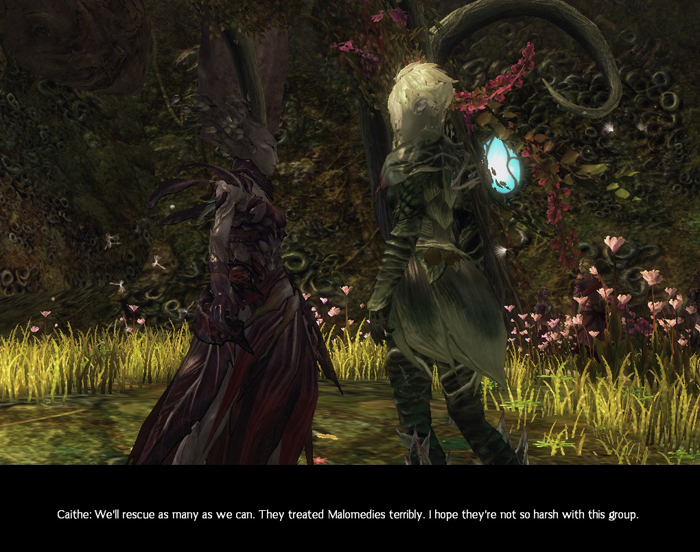
I want to say that I laud GW2 for what it attempted to do in these final episodes. I think the delivery of the story was well done. I like the idea of seeing into Caithe’s past through memory seeds and reliving things in her shoes. I really enjoyed seeing the early days of the Sylvari – the tension of the “second-born,” the struggle of the first born between each other, and their struggle against the Inquest, who sadly colored Sylvari early experiences with other races.
The first couple of memory sequences are really, really good, and I enjoyed them thoroughly. They are what I think the Living Story should be.
But then, about halfway through, I start really having issues.
The Edge of Destiny
I want to preface this by saying that in the hype a few months before GW2 released, I quelled my excitement by reading the two GW2 novels, which includes The Edge of Destiny. I’m so very glad I did, because I came in knowing a lot more about the world and I was much more forgiving to the stumbles of Destiny’s Edge because of it. I think I understood the depth of the pain and loss the group bore much more deeply than I would if I never read the story.
However, my impressions of all the characters were set by the book. One character that always seemed to conflict between book-version and game-version was Caithe. I may have totally misunderstood her in the book, but she always came off as a strong female character who was independent, confident, clever… but brash and caught up in a detrimental relationship. She may not have always made the right choices, but she seemed to fight with honor and for the right reasons in the end.
I’m just not getting that from the Caithe in the game. And I’m not even talking about her choices in the latest installment of living story, either. I haven’t played much as a Sylvari, but I remember one of my first impressions of game!Caithe in the early levels was that she was disdainfully talking about murdering someone – might have been Sylvari who were Nightmare Court or bordering on Nightmare. I can’t remember the specifics. I just remember being repulsed by how cold and cruel she sounded in the game. My response was, “That’s not the Caithe I knew from the book!”
Caithe’s Love Conundrum
With that out of the way, I want to talk about where I had some major issues with story and character development in Caithe’s final memories. Why this whole story just didn’t work for me and how her character development, rather than becoming something mysterious or long-suffering, just fell flat due to forced attempts to make her what the writers wanted her to be. Even if it didn’t make any sense.
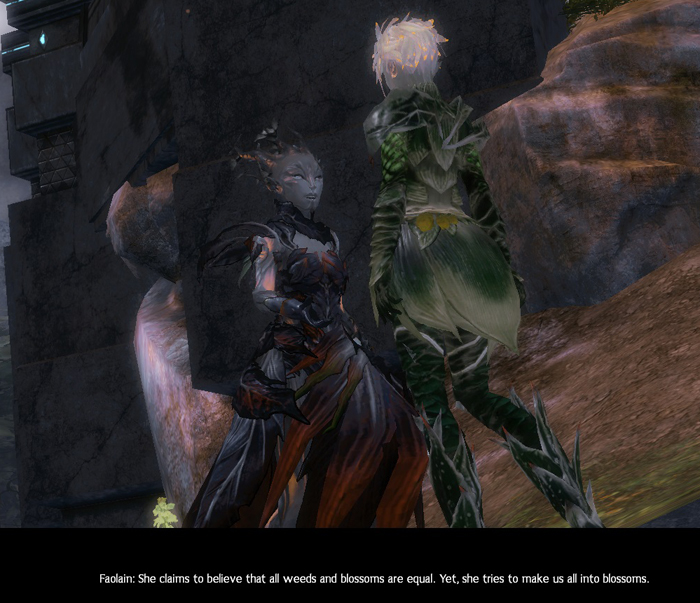
First, as interesting as it was to see young Caithe, I don’t feel this relationship between her and Faolain very strongly. Sure, they share the same love of traveling together, the same burning anger against the foes of the sylvari, the same desire to protect their people, and the same teenage angst when the Pale Tree expects nothing but perfection from her children.
It’s there, but so quickly brushed over, that I just can’t believe that a strong and independent character like Caithe could just blindly follow Faolain to do the things they did without ever once questioning until the very end. Okay, I get they both thought the Inquest had it coming. I agree with that. But when it came to slaughtering innocent centaur tribes, it turned my stomach to play through the scenario. Why would Caithe just blindly rush into this bloodbath when she, herself, could plainly see the centaur were not an enemy?
Well, some might answer “She loves Faolain! She’d defend her love!” Which… might pass… if their relationship was realistically built up in the story. But it wasn’t well developed enough for me to accept that. One “I love you the way you are!” does not a relationship make.
Now, this might seem like it goes against my normal complaints about the other over the top relationship in GW2. True, I don’t like that, either. But I think there’s a balanced way to write a believable relationship of dedication and trust between two characters. I didn’t see it between Caithe and Faolain, though. Certainly not enough for me to believe that Caithe would act out such crimes without questioning her own, or Faolain’s, judgement.
Even when you do love someone, you don’t always agree or follow everything they do without question. Especially not murdering a tribe of creatures you were just moments before talking to peacefully. Not the way that Caithe is normally portrayed as a character -did she suddenly lose all her smarts? It just doesn’t make sense.
At the end, she tried to justify it with a weak, “They attacked first. She was defending herself.” But even Caithe didn’t sound convinced of this when she said it.
Caithe’s Moral Conundrum
I didn’t like the centaur scene, but I could have overlooked it if not for the way the final memory played out. This whole scene was the real kicker.
Okay, so she and Faolain track down their sister Sylvari, Wynne, whom Faolain suspects is hiding information from them. That’s what this thing has been about the whole time – Faolain throwing a temper tantrum that Wynne is hiding something important from the rest of the Sylvari.
When they finally catch up to Wynne and corner her, Wynne refuses to tell them what they want to know.
Faolain’s response: “I’ll just torture it out of her.”
Her own sister. Right. Sounds like a perfectly legit response.
This is the first time Caithe actually stops and tells Faolain that she’s taking it too far. The first argument from Caithe during this whole nasty ordeal. Finally, she stands up for Wynne, who is a sister to her.
But that lasts all of one or two sentences before Faolain goes off to find a instrument of torture anyway, leaving Caithe to watch Wynne. What does Caithe do? Does she try to get her sister out of that mess?
No, they just stay there waiting for Faolain to come back.
Ok.
In the meantime, Wynne convinces Caithe that Faolain is doing the wrong thing and is acting out in desire to gain power. She says that she can’t allow Faolain to know the secret, because Faolain will use it against the Pale Tree.
Then Wynne does something totally illogical. She tells Caithe the terrible secret she’s been hiding from the other Sylvari.
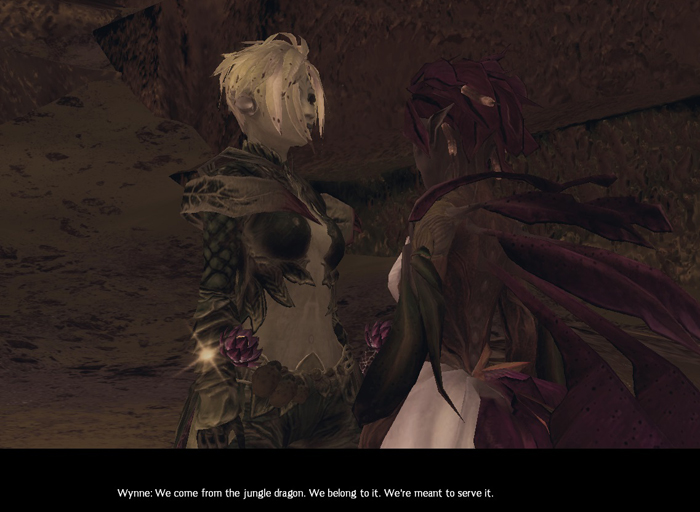
Wait. What? Why? Why would she do that? Caithe is obviously close to Faolain. If this information could be the end of their race, and Wynne didn’t trust anyone with it, why tell someone now? And why Caithe? It doesn’t cut it to say “Well, Wynne wanted Caithe to know how dire the situation was.”
This… just didn’t make sense. Especially with what happened next.
Then Wynne tells Caithe that the only way out of this is for Caithe to kill her.
Wait. What? What? Really? How is that the ONLY way out?
How about Caithe saying: “You know, I see why you kept this a secret. Let me help you escape Faolain, and we can go back to the Pale Tree where we can talk about this. We can get out of here with my super neat shadow flicker magic (that I used to infiltrate the Inquest lab in a previous episode), because I have cool powers like that.”
Or what about Caithe saying: “You’re my sister and I can’t kill you! I may love Faolain, but this is going too far, and I want to help her. There’s two of us and one Faolain. We can subdue her, take her back to the Pale Tree, and figure out what to do from there.”
What Caithe actually does: “Okay! You’re right! Stab! You’re dead!” *sobs uncontrollably*
And why does she do that? Because the writers want…
Caithe: “Oh, I am the poor, tormented character who killed her sister in cold blood, was shunned by the Pale Tree, driven apart from my (supposed) lover… and had to bear the dark secret of our entire race for all this time! This is why I back-stab your party and keep stealing Glint’s egg. I have perfectly good reasons that you can’t possibly understand!”
Right?
Right?
*sigh*
I wish they spent more time thinking about their story and less about making flashy trailers to hype people up…
